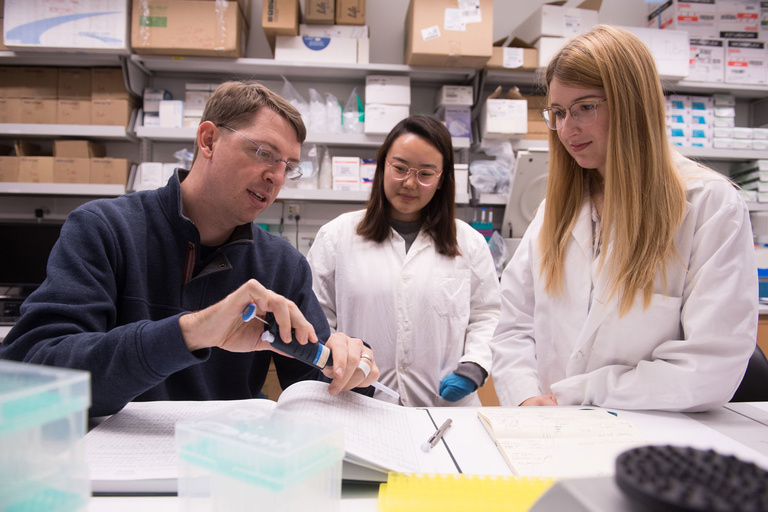
The University of Iowa is thrilled to announce that James Ankrum, an associate professor in biomedical engineering, has been selected for a Fulbright Scholar Award in Ireland for the 2022-2023 academic year.
Ankrum is one of over 400 U.S. professionals, artists, and scholars who will travel abroad this year through the Fulbright Scholar Program, a prestigious and competitive fellowship that helps in supporting research opportunities and establishing long-term relationships between people and nations. Alumni include 61 Nobel Laureates, 89 Pulitzer Prize winners, 76 MacArthur Fellows, and thousands of leaders and world-renowned experts in academia and many other fields across the private, public, and non-profit sectors.
"James's research and teaching are stellar, and his commitment to university service and shared governance is commendable. He is among our university’s top faculty, and I am thrilled he has the opportunity to expand the global audience for his work," says Russ Ganim, associate provost and dean of International Programs.
Ankrum will be working with colleagues at the Royal College of Surgeons in Ireland (RCSI), to develop new tools in the field of regenerative medicine for surgeons to promote healing of large and complicated wounds.
“The group I’ll be joining is a world leader in tissue engineering and 3D bioprinting, and I look forward to combining my own expertise in cell based therapies with theirs to come up with some powerful solutions to treat complex wounds,” says Ankrum.
“The group I’ll be joining is a world leader in tissue engineering and 3D bioprinting, and I look forward to combining my own expertise in cell based therapies with theirs to come up with some powerful solutions to treat complex wounds."
According to Ankrum, this work will have numerous applications, from treating chronic wounds like diabetic ulcers to treating soldiers who have been ravaged by war.
“Wound healing is something that we all take for granted, but it is essential to living a long and productive life,” says Ankrum. “Unfortunately, as we age, we lose the ability to heal through regeneration and instead form scars or worse, chronic wounds that never resolve. Regenerative medicine as a field seeks to understand the cues that drive regenerative healing and then engineer therapies, piece by piece, that actively promote healing while minimizing scar formation.”

Fulbright scholars not only teach and conduct research, but build relationships with people in their host country, and Ankrum is excited about the ways this experience will influence his work beyond his fellowship in Ireland.
“The goal is for this experience to be the start of a long collaboration that can continue after I return to campus,” says Ankrum. “Research in Ireland is very focused on translation and collaboration with industry and I look forward to being immersed in such an environment and applying the lessons I learn back at Iowa to make my own research program more translational.”
To his fellow colleagues who might be considering applying for a Fulbright in their own disciplines, Ankrum offers the following encouragement.
“If you are a faculty member considering a professional development award, applying for a Fulbright should be a no-brainer,” says Ankrum. “The process of applying for the Fulbright forces you to consider your goals for time away from the university, establish relationships with groups around the world you’d like to work with and helps clarify what you hope to gain from the experience. Considering the lofty history of the Fulbright and accomplishments of past Fulbright Scholars, applying can feel quite intimidating. My encouragement is that it’s intimidating to everyone, talk to past Fulbright Scholars; they all love to share their experiences, and apply; you can’t win if you don’t put yourself out there.”
Learn more about the UI resources for applying to the Fulbright Program
This year marks the 76th anniversary of the Fulbright Program, which has given more than 400,000 participants the opportunity to study, teach, conduct research, and contribute to finding solutions to shared international concerns.
University faculty members at all stages of their careers can apply to become Fulbright Scholars and Fulbright Specialists. Grant recipients can teach, do research abroad, or a combination of both for flexible time periods ranging from 2-6 weeks to a semester or an entire academic year.